 0
0
Exam Date: 7 September 2025, Sunday
Registration Deadline: 31 July 2025
Registration:
3G Abacus Students: Please contact your Instructors for more info on Registration
Public: Please contact UE 3G Abacus Pte Ltd for more information or queries.
Email: info@3gabacus.com
Call/WhatsApp: 9643 9754
Photos from our 10th 3G Abacus Mental Arithmetic International Competition 2025 are now available for viewing and download via the Google Drive link below!
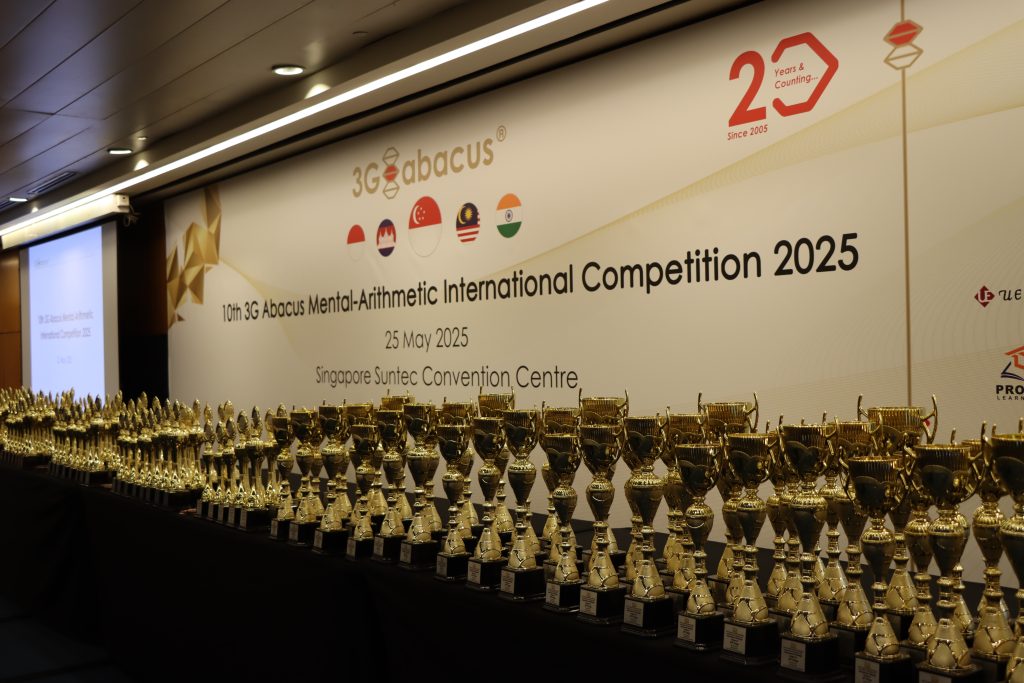
[Click here] to view or download.
Google Drive URL:
https://drive.google.com/drive/folders/1ljb2wU3iY0gj6FfaRc2BUaodeBvofmzo?usp=drive_link














We are constantly recruiting new teachers to join our 3G Abacus Instructor team. If you wish to teach and be a qualified 3G Abacus Instructor, you will need to successfully:
In addition, you will also need to have a minimum requirement of:
As a qualified 3G Abacus Instructor, you will have the opportunities to conduct lessons in RCs, CCs and Kindergartens.
If interested, please email to info@3gabacus.com, or WhatsApp to 9643 9754.
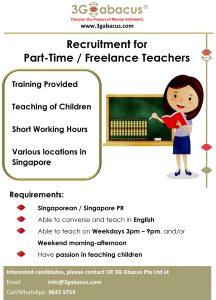

🌟 Exciting News! Registration is Now Open for Our Upcoming Competition! 🌟
📅 Deadline to Register: 10 March 2025
We can’t wait to see your talent in action!
🔔 For all 3G Abacus students: Please reach out to your instructors for more details and to sign up.
🌍 Overseas teams: We’d love to have you join! Contact us at info@3gabacus.com or message us on WhatsApp at +65 9643 9754 for more information.
Let’s make this competition a memorable one! We’re looking forward to your participation. Don’t miss out! 🎉
Summary Report (Singapore)
Top Achievers
1) Pung Zi Xin 15 year old attained Mental Degree 3 & Abacus Grade 1
2) Tan Keng Hwang Taeden 9 year old attained Mental Degree 1 & Abacus Grade 3
3) Bai Enning Berlin 8 year old attained Mental Grade 2 & Abacus Grade 4
4) Wong Hou Wai 5 year old attained Mental Grade 6 & Abacus Grade 9
Mental
|
Overall Percentage passed |
95.5% |
|
2024 Mental Top Scorer |
Mental Degree 4 · Ooi Zi Xi (15 year old) |
|
Mental Grade |
% Passed |
|
Mental Degree |
100% |
|
M1 |
57.1% |
|
M2 |
82.4% |
|
M3 |
96.4% |
|
M4 |
100% |
|
M5 |
88.2% |
|
M6 |
100% |
|
M7 |
96.4% |
|
M8 |
94.1% |
|
M9 |
95.0% |
|
M10 |
95.0% |
|
M11 |
100% |
Abacus
|
Overall Percentage passed |
96.3% |
|
2024 Abacus Top Scorer |
Abacus Grade 1 · Pung Zi Xin (15 year old) |
|
Abacus Grade |
% Passed |
|
A1 |
66.7% |
|
A2 |
100% |
|
A3 |
88.9% |
|
A4 |
92.3% |
|
A5 |
88.2% |
|
A6 |
88.3% |
|
A7 |
87.5% |
|
A8 |
97.3% |
|
A9 |
98.5% |
|
A10 |
100% |
|
A11 |
97.6% |
|
A12 |
100% |
Looking for the best enrichment programme to boost your preschooler’s mental abilities? Mental abacus could be just what you need as enrichment for your preschooler. In this article, we’ll explore how mental abacus training enhances memory, concentration, and problem-solving—key skills for academic success. Thereafter, we’ll look at the techniques and exercises involved and compare mental abacus to other programmes. Most importantly, you’ll understand why starting mental abacus early gives your child an advantage.
How Mental Abacus Works: Understanding the Techniques
Mental abacus works by enhancing visual-spatial skills and the ability to visualise numerical quantities. Children first learn the abacus tool, including how to represent numbers on the abacus using beads. After getting hands-on, they then practise mental calculations without the physical abacus. This is done by visualising the abacus in their mind’s eye and manipulating the beads mentally.
Visualisation Exercises
Techniques like mental visualisation of the abacus, bead movement and number representation are taught. Initially, children start with visualising single-digit numbers, then gradually progressing to double-digit, triple-digit and higher numbers. In doing so, this helps to strengthen their mental imagery and numerical sense.
Speed and Accuracy
For speed and accuracy, children practise doing fast and accurate calculations in their mind. This includes addition, subtraction, multiplication and division. Speed is developed through timed practices and games. Accuracy is enhanced through repetitive exercises. This is why mental abacus is the ideal enrichment for preschoolers.
Problem-Solving
Word problems and puzzles are used to apply mental abacus skills to solve real-world mathematical problems. This challenges children to think logically and strategically using the mental abacus as a tool. Their problem-solving skills are honed through regular practice.
Compared to other programs, mental abacus is very engaging for preschoolers as it taps into their natural ability for imaginative and visual thinking. It provides an interactive and fun way to build strong mathematical and mental skills from an early age. This gives children an edge and cultivates a growth mindset that will benefit them for years to come.
The Many Benefits of Mental Abacus for Preschoolers
As a parent, you want the best for your child’s development and education. Mental abacus programmes are designed to stimulate cognitive functions and build a strong foundation for your preschooler’s lifelong learning.
Enhancing Memory and Concentration
Mental abacus exercises require recalling and manipulating numbers in the mind. This helps strengthen your child’s memory and focus, which are essential skills for success in school and beyond. Studies show abacus training can lead to significant improvements in memory and concentration.
Developing Problem-Solving Skills
Mental abacus teaches students systematic approaches to solve mathematical problems. For example, your child will learn strategies to break down complex calculations into simpler steps. These problem-solving techniques can be applied across various subjects and in real-world situations.
Preparing for Academic Success
Mental abacus gives preschoolers an edge by promoting an early aptitude for math. When your child attends mental abacus classes, they will develop an intuitive sense of numbers that provides a huge advantage when learning arithmetic and mathematics in primary school. This early exposure to logical reasoning and quantitative thinking establishes a growth mindset that will benefit your child for years to come.
Cognitive Development
Between the ages of 3 to 6 years old, a child’s brain is primed for learning foundational skills that will shape their cognitive development. That is why mental abacus capitalises on this critical period, engaging preschoolers through fun and interactive activities tailored for their age group. The programme introduces mathematical concepts in an engaging multi-sensory manner using visual, auditory and kinaesthetic approaches suited for preschoolers.
Why Mental Abacus Is the Ideal Enrichment Programme for Preschoolers?
As a parent, you want the best for your child’s development and education. Compared to other enrichment for preschoolers, mental abacus is ideally suited for preschoolers as it focuses on building essential skills through play and exploration rather than rigid instruction. Mental abacus nurtures your child’s natural curiosity and sets them up for success in our fast-paced, technologically-driven world.
Building a Strong Foundation
Mental Abacus helps build a strong foundation for lifelong learning by improving memory, concentration and logical thinking. This is because the techniques taught, like visualisation and rapid mental calculation, activate both sides of the brain.
A Head Start for Primary School
The Mental Abacus programme gives preschoolers an edge by preparing them for the challenges of primary education. Under the programme, your child will develop skills like mental math, pattern recognition and speed reading that provide an advantage in mathematics and languages. These skills, coupled with improved focus and discipline, set the right mindset and habits for academic excellence in primary school.
Fun and Engaging Exercises
Mental Abacus lessons feature interactive games and activities tailored for preschoolers. Unlike passive forms of learning, Mental Abacus actively engages children through fun exercises that stimulate their curiosity. The programme breaks down complex concepts into simple steps, using colourful visual aids and rewarding incentives to keep preschoolers motivated. This makes learning an enjoyable experience for your child.
The Ideal Enrichment Programme for Preschoolers
Mental Abacus is ideal enrichment for preschoolers as it focuses on developing cognitive abilities and life skills through engaging techniques in a fun, interactive way. By building a strong foundation and preparing your child for primary school, Mental Abacus gives preschoolers an edge for success in the years to come. This programme nurtures young minds and helps children reach their full potential.
Compared to other enrichment options, Mental Abacus packs the most bang for your buck when it comes to developing the mental capabilities that really matter. Give your preschooler the best possible head start by enrolling them today in 3G Abacus’ courses!
As a parent, you know how critical it is for your child to improve their math foundation. But where do you start? How do you ensure they grasp key concepts instead of just memorising facts? Let us share some proven techniques that can improve math foundation in children. With a bit of effort and creativity on your part, your child can gain the strong base in maths they need to excel both now and later on. Let’s make it happen.
Mastering Basic Arithmetic Operations
Teaching your child addition, subtraction, multiplication and division is fundamental. Focus on one operation at a time, starting with addition and subtraction. Use visual models, like blocks, fingers or a number line, to demonstrate what’s happening. Have your child practise simple problems repeatedly to build on their basic skills and improve math foundation.
Addition and Subtraction
Start with small numbers, like 1+1 or 3-1. Have your child count out blocks or their fingers to physically represent the numbers or draw number lines together to visually show how the numbers change. Give your child simple word problems to solve, like “You have 5 apples and get 3 more apples. How many apples do you have now?” With practice and good visualisation, they’ll get faster at solving these types of problems in their head.
Multiplication and Division
Use arrays, which are objects placed in rows and columns, to model what multiplication means. For example, 3 rows of 2 blocks shows 3 x 2 = 6. For division, have your child separate a group of objects into equal piles. An example of a question to ask would be, “If you have 12 blocks and want to put them into groups of 3, how many groups do you have?” Real-world examples, like figuring out how many 3-person teams can be made from 12 students, also help with visualising the problem.
Don’t forget to praise their efforts and achievements along the way! Building confidence and a positive attitude about math at an early age will benefit them for years to come, and is critical for improving math foundation.
Developing Critical Thinking and Problem Solving Skills
As a parent, helping your child develop strong critical thinking and problem-solving skills is one of the most valuable things you can do. These skills will serve them well for life and set them up for success in any career path they choose.
An excellent way to boost these skills is through regular practice of challenging word problems. Have your child work through story problems that require them to analyse what’s being asked, figure out what information is relevant, and determine the steps needed to solve it. Start with simpler problems and work your way up to more complex ones as their skills improve.
You should also encourage your child to explain their thinking out loud as they work through problems. This helps reinforce their understanding and gives you insight into their thought process so you can provide guidance. Ask open-ended questions to stimulate their thinking—for example, instead of just asking, “What did you get for the answer?”, ask something like, “What steps did you take to get to that solution?”
Finally, show your child how these skills apply in everyday situations. Discuss how you think through problems at your own work or in managing household tasks. You can set a good example by talking through your own problem-solving process. Help them understand that these abilities are useful for more than just math class!
With practice and patience, your child will get better and better at thinking critically and solving all kinds of problems.
Resources to Improve Your Child’s Math Foundation
Online interactive math games
Interactive math games are a great way for kids to build skills while having fun. Sites like Prodigy Game, DragonBox, and Math vs. Zombies offer games that teach operations, fractions, geometry and more. These games give students instant feedback and rewards to keep them motivated.
Flash Card Apps
Flash card apps are a simple but powerful way for kids to memorise and retain math facts like addition and multiplication tables. Some highly-rated free options include DragonBox, Prodigy Math Game, Matific and Math vs. Zombies. Using flash cards for just a few minutes a day can help build number sense and fluency.
Math manipulatives
Hands-on math tools like base ten blocks, fraction tiles, pattern blocks, geoboards, and tangrams give kids concrete models to represent mathematical concepts. Using manipulatives helps children understand how numbers work, builds problem-solving skills and makes math more engaging. Look for manipulative sets that provide a variety of tools for counting, comparing and constructing shapes, fractions, and more.
These resources can help strengthen your child’s math foundation and set them up for success. Encourage your child to use them regularly, monitor their progress, and provide positive reinforcement to keep them motivated.
Create a Positive Learning Environment
A positive learning environment is essential for building your child’s math foundation. Set up a dedicated space and time for math learning that’s free of distractions. Having supplies like pencils, erasers, scratch paper, calculators and math games easily accessible will make learning more engaging for your child.
Try making math fun by incorporating interactive math websites and apps into their routine. Many are designed like games, with rewards and challenges to keep kids motivated. You can also play simple math card games together, like addition snap or multiplication war.
Create a Growth Mindset
You should also create a growth mindset in your child by praising their efforts and strategies instead of their intelligence. Say things like “You worked hard on that problem” or “I like how you thought about it step-by-step”.
Most importantly, be patient and encouraging. Stay positive even if your child struggles or makes mistakes. Help them see that math is a skill they can master, not an inherent ability. Your support and guidance will build their confidence and motivation to become independent, lifelong math learners.
Creating the right environment, mindset and motivation will set your child up for success beyond math.
Conclusion
Don’t let maths anxiety hold your child back— with your help and encouragement, they can gain confidence and excel. Maths should be fun, so remember to provide challenges, and celebrate milestones. As a parent, it’s important to plant those seeds now—the arithmetic skills and positive working habits are transferable to other areas of life, and will serve your child well for many years to come.
Have you ever wondered what is the best way to improve your child’s maths while sparking an interest in the subject? Look no further than abacus classes for kids in Singapore! These ancient calculation tools can transform your kid’s math skills in ways you never imagined. In this article, let us discover the secret formula for maths excellence that has Singaporean parents amazed.
What Is an Abacus and How Does It Work?
An abacus is an ancient calculating tool used to perform mathematical computations. It consists of beads that slide on rods, allowing you to represent numbers and do arithmetic like adding, subtracting, multiplying and dividing.
How the Abacus Works
The abacus frame has rods with beads that each represent a numerical value. The beads above the bar represent 5s, while the beads below represent 1s. By sliding the beads up and down, you can represent any number. The abacus allows you to visualise the numbers you’re calculating with, helping build a strong number sense in children.
An Example
Let’s say you want to calculate 5 + 3. On the top row, slide 5 beads up. On the bottom row, slide 3 beads up. Now you have a visual representation of 5 and 3. To add, just slide all the beads together. You now have 8 beads up – representing your answer!
Why Abacus Classes Benefit Children
Abacus classes teach children how to visualise numbers and understand quantities, building a strong foundation in mathematics. Students learn systematic techniques to solve complex calculations mentally. Regular practice helps improve concentration, logical thinking, and problem-solving skills.
Abacus classes for kids in Singapore can be engaging and fun. The hands-on nature of manipulating the beads fosters interest in math. Students can track their own progress as their speed and accuracy improve over time. Abacus skills are useful for daily life and help build confidence in math.
With the right guidance, abacus classes enhance your child’s mathematical ability and mental skills in an enjoyable way. This education provides benefits that will last a lifetime.
The Benefits of Abacus Learning for Developing Math Skills
Learning the abacus offers many benefits for developing your child’s mathematical abilities. Studies show that students who learn abacus calculation tend to have stronger number sense, mental calculation skills, and problem-solving abilities compared to students who don’t.
Improves Number Sense
Abacus classes for kids in Singapore develops a strong number sense in your child by allowing them to visually represent numbers. They can see how the abacus beads correlate to the decimal place value system, helping them gain a deeper understanding of how numbers work. This solid foundation in number sense will benefit them tremendously in higher math.
Boosts Mental Calculation Ability
Using an abacus requires mental visualisation of the bead movements. This helps children get faster at mental calculation as they start to do the calculations in their head. With regular practice, they can perform quick mental calculations with accuracy. This ability will give them an edge in competitive exams where time is a factor.
Enhances Problem-Solving Skills
Abacus calculation involves logically thinking through a multi-step problem and then solving it efficiently. This helps children develop strong problem-solving skills that are useful for math and in life. They learn to break down problems into small, manageable steps, think logically about solutions, and evaluate different options – all valuable skills for success in mathematics and beyond.
With the many benefits of abacus learning, enrolling your child in abacus classes is one of the best ways to give them a head start in math. At 3G Abacus, our engaging abacus programmes are designed to develop your child’s mathematical abilities in a fun and stimulating environment. Contact us today to learn more!
Choosing the Best Abacus Classes for Kids in Singapore
Focus on Teaching Methods and Skills
When choosing an abacus class for your child, look for schools that emphasize teaching mental math skills, not just abacus techniques. The abacus should be used as a tool to build a strong math foundation and improve skills like mental arithmetic, logical thinking, and problem-solving. Ask about the curriculum and teaching methods to ensure focus is on developing key skills, not just speed or competition.
Qualified and Experienced Teachers
Seek out abacus classes taught by experienced teachers with proper certification and training. Qualified teachers will have a strong grasp of learning techniques and skills development for different age groups. They can properly assess your child’s abilities and needs to keep them challenged and engaged. Well-trained teachers are also better equipped to motivate students and make learning fun.
Student-Centered Approach
Look for abacus schools that take a student-centered approach, not one focused primarily on competition or test scores. Classes should be tailored to students’ skill levels and pace of learning. Teachers should give students individual guidance and encouragement. The environment should be supportive rather than high pressure. An emphasis on developing a love of math and building confidence will serve your child well beyond any single class or program.
Demo Classes and Flexibility
Reputable abacus schools will offer demo or trial classes so you can evaluate the teaching style and curriculum before committing. They will also allow students to join classes at any time rather than just at the start of a new term. This flexibility indicates a focus on meeting students’ needs rather than rigidly adhering to schedules. It also allows your child to start classes when they are ready to ensure the best experience and results.
With the right abacus school and teacher, these classes can be fun, enriching, and help build a lifelong appreciation of mathematics. Do your research, ask the right questions, and find a program focused on developing skills and a love of learning to set your child up for success.
Conclusion
We hope that you understand the benefits of abacus learning and how it can help build your child’s math skills. With the right abacus class that focuses on boosting mental math, speed calculation, and problem-solving, your kid will enjoy maths in no time. So take action today and enroll them in an abacus class that fits their needs. Remember, we’re here at 3G Abacus to answer any other questions and help find the perfect class for your aspiring mathematician.


For your child, calculating sums in their head can seem daunting, however, it doesn’t have to be. Read on for some brilliant tips to improve your mental calculation skills from the experts at 3G Abacus. We’ll cover simple exercises to sharpen their skills, helpful visualisation techniques, fun maths games for all ages, speed calculation methods and more. Get ready to flex those mental maths muscles and let’s get calculating.
Understanding Mental Calculation
To get better at mental math, you first need to understand how it works. Mental calculation taps into your mind’s inherent ability to manipulate numbers and solve problems logically.
The key is to start with the basics. Focus on simple addition, subtraction and multiplication. As your child builds up their skills, move on to larger numbers and more complex problems.
With regular practice of simple exercises like adding single-digit numbers together in your head, your child’s mind will get faster at processing numbers. In no time, they’ll be multiplying double digits in a snap!
Warm Up Exercises
Warm up your child’s brain with simple calculations. Flash cards are great for this. Hold up a card with a problem like 12 x 9 and have your child say the answer aloud. Give a prize for getting it right quickly! Once they’ve mastered the times tables, move on to adding and subtracting larger numbers in their head.
Visualisation Techniques
To improve mental calculation skills, visualisation techniques are key.
Have your child visualise the numbers in their mind. Ask them to imagine the numbers as physical objects, like blocks, that they can manipulate and combine. This visualisation technique will make mental math feel more concrete. With regular practice, these mental images will become second nature.
Mental Math Games and Puzzles
Mental math games provide an engaging way to improve calculation speed and problem-solving skills. Crossword or sudoku with numbers instead of letters are great options. Set a timer and race to complete the puzzle. These kinds of timed challenges boost your child’s mental math fluency.
For a more active game, try flash cards. Make your own set with simple addition, subtraction, multiplication and division problems on one side and the answers on the other. Get involved with your child and quiz each other by flashing the problems, seeing who can say the answer fastest. Start with single-digit problems and work your way up to multi-digit operations.
Another classic is the 24 game. Use four numbers, like 3, 5, 7 and 9. Arrange them with any of the four operations to make the number 24. Whoever finds the most solutions in a minute wins. This game activates critical thinking and the ability to manipulate numbers in your head.
Mental math puzzles and games provide an engaging way to improve calculation speed and problem-solving skills. Find what works for your child and have fun while strengthening your mind. Speed will come with regular practice!
Daily Life Applications
When you’re out and about with your child, try asking your child to do quick mental calculations to keep their mind sharp. For example, when shopping for groceries, ask your child to estimate the total cost of items in your cart to the nearest $5 or $10. Or calculate the GST at a restaurant without using a calculator.
Little exercises like these, done regularly in your daily routine, will help build your child’s mental math fluency in a fun, low-pressure way.
Abacus and Other Tools
An abacus is a simple yet useful tool to help build mental math skills. The abacus allows your child to visualise the quantities and math problems, helping to strengthen the connection between the concrete and abstract. Start by practicing the basics – have your child do simple addition, subtraction, multiplication and division problems on the abacus. As their skills improve, encourage mental calculation alongside the abacus. Eventually, they’ll be able to do the problems in their head!
Other useful tools include dice, cards, and dominoes. Have your child roll dice to determine the numbers in a problem. For example, roll 3 dice to get 3 digits for a 3-digit by 1-digit multiplication problem. Deal cards to determine the operands in an equation. Line up dominoes to represent the numbers in an addition or subtraction problem, then have them say the total. These kinds of engaging, hands-on tools make learning fun while enhancing mental math ability.
Use Online Resources to Practice Mental Calculation
The internet offers a wealth of free resources to boost your mental math skills. Interactive math websites and apps provide an engaging way for your child to practice at their own pace. Some recommended sites offer timed tests and games to challenge yourself. These resources allow your child to start at a level that matches their current skills and progress to more advanced levels as they improve.
The 3G Abacus E-Learning System (3GAbELs) provides our students with a variety of practice questions to do at home. These questions are specifically designed for the student’s learning level, and they can train their mental calculation at their convenience.
With regular practice of these kinds of online exercises, your mental calculation abilities will strengthen over time. Take advantage of these useful tools to keep your mind sharp and math reflexes nimble.
Group Activities
To practice mental math skills as a group, try setting up some friendly competitions in the family, or with your child’s friends. A game idea would be to split into teams and have relay races where players take turns doing mental calculations. You can also play games like ‘Around the World’, where players stand in a circle and each person calls out an equation for the next person to solve. Anyone who answers incorrectly sits down, and the game continues until only one player is left standing.
These types of collaborative activities make learning math more engaging and fun. Children can challenge each other in a low-pressure way, building confidence through practice and support from peers. Educators and parents should encourage group work at home and in the classroom. Working together, students will improve their skills and develop a growth mindset around mathematics.
Tips for Parents and Educators
As a parent or teacher, you play an important role in developing a child’s mental calculation ability. Help your children set small, achievable goals and provide encouragement and praise for their efforts and progress. Give them opportunities to apply their skills in real-world situations, like cooking, shopping, or handling money.
Make learning fun by using interactive math websites and apps, as well as puzzles, games and flashcards. Work through the exercises together, explaining your thinking process step-by-step. Your enthusiasm and support can motivate them to practice and strengthen their skills.
Most of all, be patient and understand that developing proficiency in mental math takes dedication and time. With regular practice and persistence, students of all ages can improve their mental calculation and problem-solving abilities.
Sharpen Your Mental Calculation with 3G Abacus
Sharpening mental calculation skills can be a fun and rewarding journey for your child. By integrating the techniques and exercises from 3G Abacus into your daily routine, you can help make math both engaging and accessible. Remember,consistent practice and encouragement is what helps your child reap the benefits of learning mental calculations. Whether through visualisation techniques, mental math games, practical daily applications, or group activities, there are countless ways to make learning enjoyable and effective.
With the right tools and support, your child will not only improve their mental math abilities but also gain confidence in their overall problem-solving skills. So, keep practicing, stay positive, and watch as your child’s mental calculation skills flourish!
You’ve been wondering if an abacus trainer course is worth the investment in 2024. This comprehensive course by 3G Abacus packs in so much knowledge from abacus techniques to classroom management to cognitive, teaching and communication skills that will develop you holistically. Read on to learn about all the skills you will gain from enrolling in our abacus trainer course!
A Comprehensive Understanding of Abacus Techniques
Of course, as an abacus mental arithmetic trainer, you’ll gain an in-depth knowledge of abacus calculation techniques. You’ll learn versatile methods for addition, subtraction, multiplication and division on the abacus. With practice, these techniques will become second nature, allowing you to perform lightning-fast calculations.
Your understanding of abacus methods will provide a strong foundation for teaching students. You’ll be able to break down complex calculations into easy-to-follow steps. At the end of the course, you will take an assessment, and upon passing, you will be certified as an abacus instructor.
Enhanced Mathematical Skills
Our abacus trainer course will boost your mathematical abilities in many ways. You’ll gain a deeper understanding of place value and number sense as you manipulate the beads. Mental arithmetic will become second nature as you practice the techniques.
Not only will you get faster at doing math, but you’ll get better at estimating, approximating, and detecting unreasonable answers. These higher-order skills are useful for real world situations where exact calculations aren’t possible.
Cognitive Development Insights
An abacus course provides mental benefits that extend far beyond math skills. Studies show abacus training enhances cognitive abilities like concentration, visualisation, and memory. As an abacus student, you’ll gain insight into how these mental abilities are strengthened through practice. You’ll also learn strategies to apply these cognitive skills to other areas of life.
For example, the intense focus required to manipulate the abacus beads helps improve concentration and attention span. The abacus relies on visualisation – you have to see the beads moving in your mind. This boosts visual thinking and the ability to hold complex images in your working memory. Memorising the sequences of bead movements, called algorithms, also exercises your long-term memory in a way that translates to remembering names, dates, and other information.
These kinds of cognitive gains will serve you well as an abacus instructor. You’ll be able to explain to students and parents the brain benefits of abacus study. And in your own life, a sharpened mind is its own reward.
Effective Teaching Strategies
As an abacus trainer, you’ll gain insights into teaching techniques that engage students. For example you’ll learn how to assess students’ needs and tailor lessons accordingly. You will also learn how to keep students motivated using encouragement, rewards and competitions.
Curriculum Development Skills
Curriculum development is an essential skill for any abacus trainer. Through our course, you’ll gain insights into designing engaging lesson plans, workbooks and interactive activities for students at different levels. Developing a spiral curriculum that revisits concepts at higher levels of complexity is key.
Classroom Management Techniques
A good abacus trainer knows that effective classroom management is key to productive learning. You’ll learn strategies to keep your students engaged and on task. For example, organising your students into groups lets them work together on practice problems, keeping them actively involved. Circulating the room as they work gives you a chance to check their progress and provide guidance. Most importantly, keeping lessons fun and interactive will motivate your students to push themselves. Let their curiosity drive explorations of new techniques and number systems. With the right approach, you’ll gain valuable experience in creating an optimal learning environment.
Improved Communication Skills
Your communication skills experience a major boost from an abacus course. Explaining mathematical concepts and techniques to students requires clear communication and patience. Through our course, you’ll gain experience simplifying complex ideas into easy-to-understand terms that resonate with your students.
Leading a class full of curious minds also builds confidence in public speaking. Answering questions on the spot and managing different learning needs helps you think on your feet.
Our abacus trainer course also provides opportunities to connect with other teachers. Sharing ideas, collaborating on lessons, and learning from more experienced instructors allows you to strengthen your own teaching skills. Building a network of fellow abacus enthusiasts leads to new opportunities and partnerships that benefit you and your students.
Confidence and Leadership Skills
A trainer course in abacus and mental arithmetic provides a range of benefits that will serve you well for life. One of the most valuable skills you will develop is confidence in your abilities. As you master the abacus techniques and build your skills in calculation speed and accuracy, your confidence will grow. This self-assurance will permeate into other areas of your life, allowing you to tackle new challenges without hesitation.
With competence comes authority. The knowledge and skills you gain will establish you as an expert in your field. This expertise will open up leadership opportunities, whether as an abacus instructor, curriculum developer or school administrator. The chance to guide and motivate students as they discover their talents for mental math can be an extremely rewarding experience. Your abilities and passion for the subject will inspire students and set a positive example.
Enroll in 3G Abacus Centre’s Abacus Trainer Course in Singapore
From strengthening your math skills to developing your mind, you’ll gain so much from this experience. Not only will you pick up useful teaching and classroom management tools, but you’ll also build up your confidence, communication abilities, and leadership chops. Whether you want to inspire young learners or launch a new career, this course has got you covered. Sign up for our abacus trainer course today and become a qualified abacus trainer!
Have you ever felt like your Maths lessons could do with a shake-up? Want to take your teaching to the next level and really get those little grey cells going? Well, you’re in luck! Abacus teacher training could be just the thing to transform your teaching methods and really get students fired up about numbers. Over the next few paragraphs, we’ll explore how abacus training can help you enhance instructional techniques, improve student engagement, develop critical thinking, personalise learning, build maths confidence, and support cognitive development. With a range of dynamic abacus teaching strategies under your belt, your math lessons will never be the same again! Stick with us to find out how this ancient calculating tool can bring some modern magic to your classroom.
The Benefits of Abacus Teacher Training
Abacus teacher training provides instructors with the skills and knowledge to teach mental math concepts and techniques to students using an abacus. Through the training, you’ll learn instructional methods tailored to different age groups and math abilities.
Enhancing Instructional Techniques
As an instructor, the Abacus training program provides you with tools to make lessons more engaging and impactful. You’ll learn new ways to demonstrate mathematical concepts that captivate students’ attention, like using visual models and real-world examples.
Interactive lessons help bring math to life. Abacus shows you how to incorporate physical blocks, flash cards, and other hands-on materials so students can explore ideas in a fun, tactile way. These kinds of activities stimulate creativity and logical thinking in children.
The program also gives guidance on using technology to enhance learning. Things like math games, interactive whiteboards, and educational apps make practising skills more motivating and help concepts stick.
By the end of the course, you’ll have a fresh set of skills that transform math into an exciting discovery process. Your students will become active participants in their education, developing a deeper understanding and enthusiasm for the subject.
Improve Student Engagement
When students are engaged, they are focused and motivated to learn. Abacus teacher training provides strategies to boost student engagement in your math classes.
You can learn to conduct interactive lessons where students can discover concepts with manipulatives like blocks, Legos or actual abaci to demonstrate how the abacus works. Have students follow along and even let them figure some things out on their own. These kinds of hands-on activities stimulate interest in learning.
The variety of engaging instructional techniques that comes with abacus teacher training will transform your math class into an exciting learning environment where students are active participants.
Develop Critical Thinking and Problem-Solving Skills in Students
Abacus training teaches students critical thinking and problem-solving in an engaging way. As students progress through the abacus mental math curriculum, the problems become more complex, requiring students to think logically and strategically. Students learn to break down problems into a series of steps, identify patterns, and make connections between mathematical concepts.
Through regular practice of abacus mental math techniques, students strengthen key cognitive skills like reasoning, logic, and strategic thinking. These skills transcend math and support students’ development in all areas of learning. With a growth mindset developed through abacus math, students gain confidence in their ability to tackle difficult problems and persevere to find solutions.
Personalise Learning Experiences for Students
Abacus teacher training allows you to customise lessons to match students’ needs and learning styles. You can gear activities towards visual, auditory or kinesthetic learners. Let students choose abacus tasks or games that they find most engaging and fun.
Give students opportunities to express themselves creatively through abacus. For instance, have them create their own word problems or come up with new abacus techniques to teach their peers. Personalised learning keeps students motivated to achieve more.
Most importantly, provide students with choices and a level of control over their learning. Let them set personal goals to work towards and reward their efforts and progress. When students feel empowered in the classroom, they take more ownership of their education.
Personalised learning leads to improved student outcomes and sets them up for success beyond the abacus. Help your students discover and pursue their passions through an educational experience tailored to their needs. Transform your teaching by making learning personal for every student.
Building Confidence in Math
Developing confidence in math is crucial for students. Abacus teacher training provides practical techniques to boost students’ confidence in their math abilities. As an abacus teacher, you’ll learn how to break down complex problems into smaller, more manageable steps. This helps students feel less overwhelmed and more assured in their skills.
You’ll also discover strategies for providing students encouragement and praise for their efforts and achievements. Recognizing students’ progress, not just their grades, builds motivation and self-belief. Let students know you believe in them and their ability to succeed. With your support and guidance, their confidence in math will grow.
Enhance Cognitive Development
An Abacus Teacher Training course will help you enhance the cognitive development of your students. As you learn effective teaching techniques for the abacus, you’ll gain valuable skills that translate to teaching math concepts in general.
For example, the abacus uses a hands-on, multi-sensory approach that engages students visually, auditorily and kinesthetically. This style of learning has been shown to forge more neural connections in the brain, leading to deeper understanding and memory retention. Your students will build mental math skills through repeated practice and gain an intuitive sense of number relationships.
These types of enriching mental exercises have been shown to build math fluency and improve overall brain connectivity in children.
After an abacus course, you’ll feel empowered to bring these types of interactive, brain-building activities into your regular math lessons. Your students will thrive with an engaging curriculum that develops cognitive skills they can apply broadly in life. Overall, abacus teacher training is a win-win, setting both you and your students up for success.
Enhance Your Teaching Today with 3G Abacus
The benefits of abacus teacher training are clear. By developing your instructional techniques, improving student engagement and building critical thinking, you can transform math lessons. Students will be more confident, with enhanced cognitive skills. Most importantly, you can personalise learning to unlock every child’s potential. The future of maths education starts with you. Seize this opportunity to equip yourself with new skills through abacus teacher training at 3G Abacus, and watch your students thrive.
As a parent in Singapore, you understand the importance of a strong foundation in mathematics for your child’s academic success and future career prospects. Mental arithmetic has long played a pivotal role in Singapore’s education system and curriculum. Developing strong mental math skills from a young age provides lifelong benefits for analytical thinking, memory, focus and confidence. In this article, we will explore the history and role of mental arithmetic in Singapore’s education system, teaching methods and approaches, common challenges faced by students, and the future of mental math in Singapore. With expertise from 3G Abacus, a leader in abacus and mental arithmetic education, we aim to provide an in-depth look at how mental maths proficiency supports overall learning for Singaporean students.
The History and Evolution of Mental Arithmetic in Singapore’s Education System
The Introduction of Mental Arithmetic
Mental arithmetic has been an integral part of Singapore’s mathematics curriculum since the 1960s. It was first introduced to strengthen students’ mathematical abilities and numeracy skills through quick mental calculations without relying on pen and paper or calculating devices. Over time, mental arithmetic gained widespread acceptance and became entrenched in Singapore’s education system.
Shift to Mastery of Mental Arithmetic
In the 1980s, the Ministry of Education recognised the importance of mental arithmetic as a foundational mathematical skill and made it compulsory for all primary school students to master. This led to the development of structured mental arithmetic programmes and competitions to motivate students. In 2005, 3G Abacus was founded to supplement classroom learning and help students build a strong foundation in mental arithmetic from an early age.
Current Role and Importance
Today, mental arithmetic remains a key component of the mathematics curriculum for primary and secondary students in Singapore. Nationwide mental arithmetic competitions and examinations held in Singapore, provide and promote the learning of Mental Arithmetic. Strong proficiency in mental arithmetic is seen as a basic expectation and life skill that all students should acquire to prepare them for higher education and careers in the 21st century.
Mental arithmetic has clearly evolved to become an integral part of Singapore’s education system over the last few decades. With its emphasis on building numeracy skills from an early age, mental arithmetic will continue to play an important role in shaping students’ mathematical development and preparing them for the digital age.
Mental Arithmetic in Singapore’s Primary School Curriculum
Mental arithmetic has been an integral part of Singapore’s mathematics curriculum since the 1960s. Students start learning mental arithmetic skills from Primary 1, beginning with simple addition and subtraction. By Primary 3, the focus shifts to multiplication, and in Primary 5, division is introduced.
Building a Strong Foundation
Embedding mental arithmetic in the early primary years helps build a strong foundation in number sense and mathematical thinking. Students develop computational fluency, learn mathematical concepts in a structured way, and gain confidence in manipulating numbers mentally. These skills enable them to transition smoothly to more complex arithmetic and algebra in secondary school.
Regular Practice and Drills
To achieve mastery in mental arithmetic, regular practice and drills are essential. Schools conduct mental arithmetic lessons and worksheets 2-3 times a week, with each session lasting 10-15 minutes. Students take part in mental arithmetic competitions and benchmarking to motivate them to practise.
Mental arithmetic has been pivotal in establishing Singapore students’ strong mathematical foundation and global competitiveness. By continuing to emphasise its importance in the curriculum and exploring new ways to make learning enjoyable and effective, mental arithmetic will remain a hallmark of Singapore’s mathematics education.
The Benefits and Life Skills Developed Through Mental Arithmetic
Mental arithmetic plays an integral role in developing important life skills from an early age.
Critical Thinking
The practice of mental calculation enhances critical thinking abilities in students. They learn to analyse problems logically and creatively find solutions without relying on written methods. This cultivates quick thinking skills and the ability to make connections between mathematical concepts.
Improved Memory
Memorising multiplication tables and mathematical formulae challenges students to strengthen their memory. The repetition involved in mental arithmetic leads to the automatic recall of facts, allowing students to solve complex problems with greater speed and accuracy.
Concentration
Mental arithmetic requires focus and concentration to solve problems in one’s head. Students develop the discipline to avoid distractions, focus their attention, and persist in finding solutions. This ability to concentrate deeply serves them well beyond the mathematics classroom.
Confidence
Success in mental arithmetic builds confidence in students as they master skills and achieve their goals. They gain a sense of accomplishment from solving problems efficiently and a belief in their own abilities as mathematicians. This confidence propels them to take on more challenging work and persevere in the face of difficulties.
Mental arithmetic may be an age-old practice, but its benefits are timeless. Embedded in Singapore’s curriculum from an early age, it provides students with a strong foundation in mathematics and life skills that will support them for years to come. Programmes and competitions further cultivate passion for the subject, producing students that excel on the world stage. Mental arithmetic is a tradition worth preserving for future generations.
Prominent Mental Arithmetic Programmes and Competitions in Singapore
In the mid-1990s, Singapore introduced various national mental arithmetic programmes and competitions to spur students’ interest in the subject and hone their skills. Students from primary and secondary schools compete to solve complex arithmetic problems quickly and accurately in their heads.
Various Abacus Mental Arithmetic competitions organised by different organisations provide a platform for students to benchmark themselves against the national average and compete for the championship title in their age group. These competitions significantly raised the profile of mental arithmetic in Singapore’s education landscape.
At 3G Abacus, we also organise National and International mental arithmetic competitions. 3G Abacus hosts the prestigious 3G Abacus Mental Arithmetic Competition and 3G Abacus Mental Arithmetic International Competition bi-annually. Students demonstrate their mental calculation techniques and compete for attractive prizes while gaining valuable competition experience.
Through participating in these well-established mental arithmetic competitions, students can hone their skills, build confidence in applying techniques under pressure and bond over their shared interest in this niche yet important subject. The competitions also allow students to gain recognition for their abilities, with the potential to represent Singapore on the global stage.
Teaching Methods and Approaches for Developing Strong Mental Arithmetic Skills
Practise Daily
To build mental arithmetic proficiency, students should practise regularly through daily worksheets and exercises. Repeated practice of mental calculation techniques helps to strengthen neural pathways in the brain responsible for mathematical thinking. At 3G Abacus, students go through daily timed practices and drills to enhance their mental arithmetic skills.
Focus on Accuracy and Speed
Mental arithmetic skills require both accuracy and speed. Students should start by focusing on solving problems correctly, then work on solving them faster. Teachers can design incremental speed tests and timed practices to help students improve. 3G Abacus’ mental arithmetic program incorporates regular speed and accuracy tests to track students’ progress.
Apply Mnemonics and Abacus Techniques
Effective teaching methods for mental arithmetic include applying mnemonics and abacus techniques. Mnemonics, like rhymes, acronyms and songs, can help students memorise mathematical facts and formulae. Abacus visualisation is used to help young children visualise mathematical operations and solve problems mentally. 3G Abacus teaches students advanced abacus techniques to boost their mental arithmetic abilities.
Set Individual Goals
Teachers should work with each student to set individual improvement goals to keep them motivated. Goals could include solving a certain number of problems accurately in a set time, memorising multiplication tables up to a certain number or achieving a score on a mental arithmetic assessment. At 3G Abacus, students set weekly goals to master new abacus techniques and improve their speed and accuracy.
Mental arithmetic skills are essential for students to develop a strong number sense and logical thinking abilities. With diligent practice of effective teaching techniques, students can build proficiency in mental calculation and reap benefits that will serve them well beyond the classroom.
Mental Arithmetic Outside the Classroom
A key component of Singapore’s mental arithmetic education is applying the skills outside of the traditional classroom setting. Students are encouraged to practise mental calculation techniques in their daily lives to strengthen their abilities and make the methods second nature.
Competitions and Challenges
Several nationwide mental arithmetic competitions and challenges provide opportunities for students to demonstrate their skills. Events like mental math competitions and abacus mental-arithmetic competitions allow students to compete against peers from schools across Singapore. Success in these competitions can build confidence in students’ abilities and motivate them to continue honing their skills.
Interactive Apps and Games
Interactive mobile apps and games focused on mental arithmetic provide an engaging way for students to practise outside of school. Apps like Squeebles Maths Busters and DragonBox offer mental math puzzles and games suited for a range of ages and skill levels. Using apps and games for just 15 or 20 minutes a day can help reinforce the techniques and speed students have developed.
Applying Mental Arithmetic Skills to Daily Life
Students should look for opportunities in everyday life to apply their mental calculation skills. For example, they can calculate the total cost of items while shopping without writing anything down, figure out the number of minutes until their next appointment, or determine how much time is left before their favourite television show starts. Real-world application of skills helps to make mental arithmetic second nature.
With competitions, interactive apps, real-world practice, and encouragement from schools and parents, students in Singapore’s education system can become highly proficient in mental arithmetic outside of the classroom. Mastery of these foundational skills at a young age provides a strong base for continued success in mathematics and beyond.
The Future of Mental Arithmetic in Singapore
In Singapore, mental arithmetic has already established itself as an important part of the education curriculum and will likely continue to do so in the foreseeable future. Advancements in teaching pedagogy and learning strategies will further enhance students’ mental calculation abilities. Educators are developing interactive digital applications and online learning platforms to supplement traditional teaching methods. These technologies can generate customised questions targeted at a student’s current ability and learning pace.
Competitions will motivate students to achieve mastery in mental arithmetic. Events such as the Singapore Mental Arithmetic Competition and Asia International Mathematical Olympiad will inspire students to develop their skills through dedicated practice and preparation. Success in these competitions can build confidence and nurture a growth mindset in students.
Partnerships between schools and private enrichment centres will become more common. Organisations like 3G Abacus have developed a syllabus that meets the needs of students in terms of calculation skills.
Mental arithmetic has been and will continue to be an integral part of Singapore’s education system. Advancements in pedagogy, competitions and public-private partnerships will further strengthen its role in developing quick-witted and nimble-minded students ready to thrive in today’s fast-paced world. The future of mental arithmetic in Singapore looks bright, with an exciting road ahead.
Conclusion
In conclusion, mental arithmetic has played an important role in Singapore’s education system for decades. Even as new technologies continue to develop, the core benefits of mental maths will remain invaluable. As a parent, understanding the history and value of mental calculation can help you make informed choices. By enrolling your child in programs like those offered by 3G Abacus, you ensure they develop key skills for academic and lifelong success. Though mental maths brings challenges, our innovative teaching methods make it rewarding and achievable for all students. By supporting your child’s mental arithmetic education today, you invest in their future, shaping a confident, nimble-minded member of society.

Date: 7 July 2024
Venue: Genting International Convention Centre, Genting Highland Malaysia
5 year old
Wong Hou Wai: Rookie 1st Prize; National 3rd Prize; Eilte 4th Prize; Abacus top 7th placing

6 year old
Zachary Kai Salim: Rookie: 3rd Prize; National 4th Prize

7 year old
Woo Zheng Yuan: Rookie 2nd Prize; National 4th Prize
Bhudolia Kiaan: Rookie 2nd Prize; National 4th Prize
Lua Cheong Sui: Rookie 2nd Prize; National 4th Prize
Mithil Madhanraj: Rookie 3rd Prize; National 5th Prize
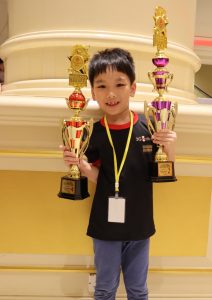
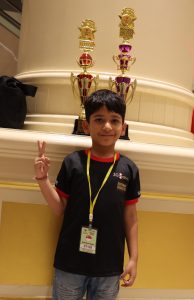

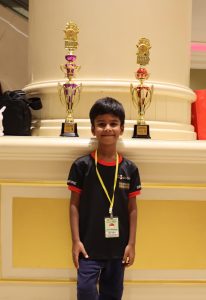
8 year old
Lim Xin Qi: Rookie 1st Prize; National 2nd Prize; Eilte 4th Prize
Saravanan Balamurugan: Rookie 2nd Prize; National 3rd Prize; Eilte 4th Prize
Tedric Tek En Xu: Rookie 2nd Prize; National 4th Prize; Eilte 4th Prize
Ling Qi Feng: Rookie 2nd Prize; National 3rd Prize
Pang Kai Heng Dash: Rookie 3rd Prize; National 4th Prize
Toh En Fei Shantelle: Rookie 3rd Prize; National 5th Prize
Kang Gui Xin Zoey: Rookie 3rd Prize; National 5th Prize
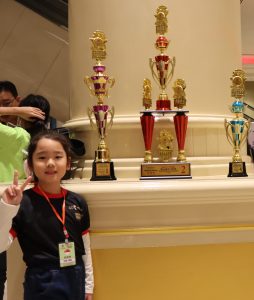

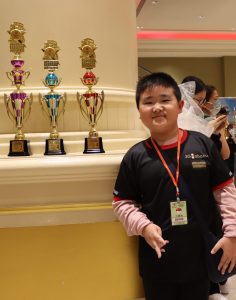
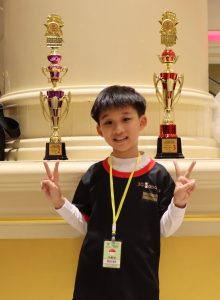



9 year old
Lua Cheong Hon: Rookie 1st Prize; National 2nd Prize; Eilte 4th Prize
Wong Kai Yi Lionel: Rookie 3rd Prize; National 4th Prize; Eilte 4th Prize
Auwin Leow Zhao Hong: Rookie 3rd Prize; National 4th Prize
Lum Wen Kai Kaiden: Rookie 3rd Prize; National 4th Prize
Tan Ray Yang: Rookie 3rd Prize; National 4th Prize
Soh Jing Kai Daylan: Rookie 3rd Prize; National 5th Prize



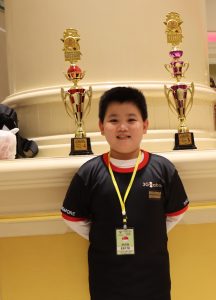
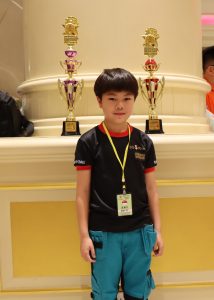

10 year old
Wong Kai Zhe Nathan: Rookie 3rd Prize; National 4th Prize; Eilte 5th Prize
Veeramachineni Rohan: Rookie 2nd Prize; National 4th Prize
Rudraksh Dilip: Rookie 2nd Prize; National 4th Prize
Tan Yuhan Emma: Rookie 3rd Prize; National 4th Prize
Daiwik Sreekumar Nair: Rookie 3rd Prize; National 4th Prize
Oh Yu Teng: Rookie 3rd Prize; National 4th Prize
Sai Kavin Madhanraj: Rookie 3rd Prize; National 5th Prize

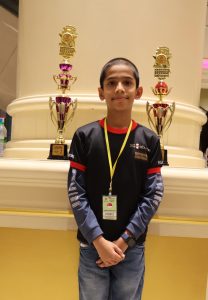
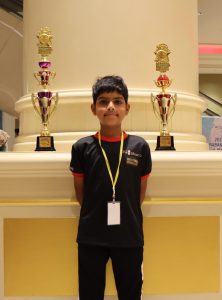

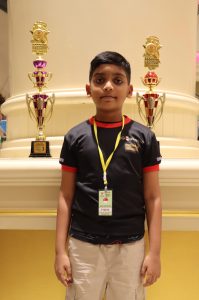


11 year old
Achyuth Vijay Krishnan: Rookie 1st Prize; National 3rd Prize; Eilte 4th Prize
Yap Yongke Algren: Rookie 3rd Prize; National 4th Prize

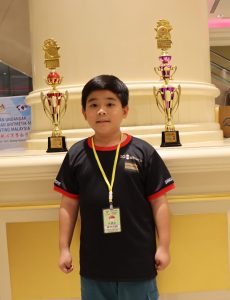
12 year old
Dyann Lam Xu En: Rookie 1st Prize; National 1st Prize; Elite 4th Prize; Abacus top 9th placing

13 year & above
Khoo Jian Yang: Rookie 2nd Prize; National 3rd Prize; Elite 4th Prize
Allada Vasavya: Rookie 2nd Prize; National 3rd Prize; Elite 5th Prize
Ooi Zi Xi: Rookie 2nd Prize; National 4th Prize
Chapparapu Sharanya Shree: Rookie 3rd Prize; National 4th Prize
Lai Zun Mun Tuzki: Rookie 3rd Prize; National 4th Prize




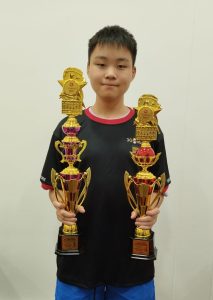
9th 3G Abacus Mental-Arithmetic International Competition 2023
was successfully held on 27 May 2023, at Suntec Convention Centre.
A big Thank You to all competitors who have participated, parents, overseas teams, partners representatives, teachers helpers, who have given your support towards this event!
Please take a view at the photos of the competitions at the Gallery.
3 of our students currently holds 6 records in fastest Mental Calculation in Singapore book of Records, on 6 November 2022 and 15 January 2023 held at 3G Abacus Head Office.
Congratulations to them!
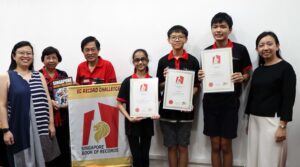
Students from left:
1) Nirvi Jain (9 year old)
Fastest Mental 3×1 Digit Multiplications in 5 Minutes, achieving 134 correct answers. (surpassing previous record of 128 correct answers)
2) Lucas Chan Yee Jie, (12 year 6 month)
Fastest Mental 4-by-1 Digit Division in 5 Minutes, achieving 102 correct answers. (surpassing previous record of 79 correct answers)
3) Ryan Khoo Jian Yang, (14 year 10mth)
Fastest Mental 6-by-4 Digit Division in 5 Minutes, achieving 48 correct answers. (New Record! Average of 6.35s per question)
Ryan has also achieved 3 other records in 2022:
i) Fastest 4-by-2 Digit Division in 5 Minutes, achieving 116 correct answers.
ii) Fastest 2×2 Digit Multiplications in 5 Minutes, achieving 104 correct answers.
iii) Fastest to Complete 50 Multiplications & 50 Division on Sporcle, in a time of 0min 57sec.
Check out more photos in the Gallery here.
Link to: Singapore Book of Record
